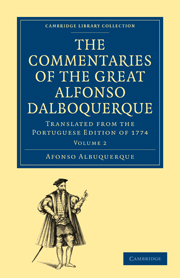 The Commentaries of the Great Afonso Dalboquerque, Second Viceroy of India
The Commentaries of the Great Afonso Dalboquerque, Second Viceroy of India Book contents
- Frontmatter
- Contents
- INTRODUCTION
- CHRONOLOGY OF PART II
- TITLE TO THE EDITION OF 1774–PART II
- TITLES OF THE CHAPTERS CONTAINED IN THE SECOND PART
- MAP OF INDIA
- PART II WHEREIN ARE CONTAINED THE DEALINGS OP THE GREAT AFONSO DALBOQUERQUE WITH THE VICEROY: AND WHAT HE DID AFTER BEING INVESTED WITH THE GOVERNMENT OF INDIA, UNTIL THE FIRST TAKING OF GOA
- CHAPTER I
- CHAPTER II
- CHAPTER III
- CHAPTER IV
- CHAPTER V
- CHAPTER VI
- CHAPTER VII
- CHAPTER VIII
- CHAPTER IX
- CHAPTER X
- CHAPTER XI
- CHAPTER XII
- CHAPTER XIII
- CHAPTER XIV
- CHAPTER XV
- CHAPTER XVI
- CHAPTER XVI
- CHAPTER XVIII
- CHAPTER XIX
- CHAPTER XX
- CHAPTER XXI
- CHAPTER XXII
- CHAPTEE XXIII
- CHAPTER XXIV
- CHAPTER XXV
- CHAPTER XXVI
- CHAPTER XXVII
- CHAPTER XXVII
- CHAPTER XXIX
- CHAPTER XXX
- CHAPTER XXXI
- CHAPTER XXXII
- CHAPTER XXXIII
- CHAPTER XXXIV
- CHAPTER XXXV
- CHAPTER XXXVI
- CHAPTER XXXVII
- CHAPTER XXXVIII
- CHAPTER XXXIX
- CHAPTER XL
- CHAPTER XLI
- CHAPTEE XLII
- CHAPTER XLIII
- CHAPTER XLIV
- CHAPTER XLV
- CHAPTER XLYI
- CHAPTER XLVII
- CHAPTER XLVIII
- CHAPTER XLIX
- CHAPTER L
- CHAPTER LI
- Plate section
CHAPTER XXX
Published online by Cambridge University Press: 05 July 2011
- Frontmatter
- Contents
- INTRODUCTION
- CHRONOLOGY OF PART II
- TITLE TO THE EDITION OF 1774–PART II
- TITLES OF THE CHAPTERS CONTAINED IN THE SECOND PART
- MAP OF INDIA
- PART II WHEREIN ARE CONTAINED THE DEALINGS OP THE GREAT AFONSO DALBOQUERQUE WITH THE VICEROY: AND WHAT HE DID AFTER BEING INVESTED WITH THE GOVERNMENT OF INDIA, UNTIL THE FIRST TAKING OF GOA
- CHAPTER I
- CHAPTER II
- CHAPTER III
- CHAPTER IV
- CHAPTER V
- CHAPTER VI
- CHAPTER VII
- CHAPTER VIII
- CHAPTER IX
- CHAPTER X
- CHAPTER XI
- CHAPTER XII
- CHAPTER XIII
- CHAPTER XIV
- CHAPTER XV
- CHAPTER XVI
- CHAPTER XVI
- CHAPTER XVIII
- CHAPTER XIX
- CHAPTER XX
- CHAPTER XXI
- CHAPTER XXII
- CHAPTEE XXIII
- CHAPTER XXIV
- CHAPTER XXV
- CHAPTER XXVI
- CHAPTER XXVII
- CHAPTER XXVII
- CHAPTER XXIX
- CHAPTER XXX
- CHAPTER XXXI
- CHAPTER XXXII
- CHAPTER XXXIII
- CHAPTER XXXIV
- CHAPTER XXXV
- CHAPTER XXXVI
- CHAPTER XXXVII
- CHAPTER XXXVIII
- CHAPTER XXXIX
- CHAPTER XL
- CHAPTER XLI
- CHAPTEE XLII
- CHAPTER XLIII
- CHAPTER XLIV
- CHAPTER XLV
- CHAPTER XLYI
- CHAPTER XLVII
- CHAPTER XLVIII
- CHAPTER XLIX
- CHAPTER L
- CHAPTER LI
- Plate section
Summary
How the great Afonso Dalboquerque gave an account to Timoja of the message which João Machado had brought from the Hidalcão to him, and of further proceedings thereupon.
The great Afonso Dalboquerque, in this interview which he held with João Machado and the Venetian, became very much alarmed on account of what he was informed with regard to the Moors of Goa, although the information was not clearly expressed. And, in order to arrive at some determination in respect to his future actions in this matter, he sent for Timoja and narrated to him the message which he had received from the Hidalcão, and the reply which he had given. And after some conversation upon these subjects, he told Timoja that information had been given to the effect that certain of the chief Moors of the city were engaged in correspondence with the Hidalcão, and had communications with the Rumes who were in his camp, therefore he desired him to give him the benefit of his advice as a friend, as to the manner in which he ought to act in order to prevent this fire from bursting out into a flame.
Timoja replied, that he had now for some days ceased to repose any confidence in the Moors, because he had always considered that they were angry at beholding the city in the power of the Portuguese; and his advice would be, that Afonso Dalboquerque should order all the principal headmen, not only Moors, but Hindoos as well, to be collected together in the fortress, for in such times as these one ought not to confide in either the one or the other.
- Type
- Chapter
- Information
- The Commentaries of the Great Afonso Dalboquerque, Second Viceroy of IndiaTranslated from the Portuguese Edition of 1774, pp. 147 - 150Publisher: Cambridge University PressPrint publication year: 2010First published in: 1877


